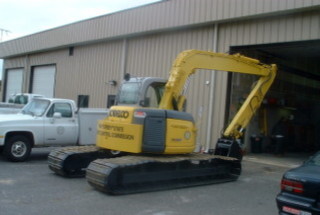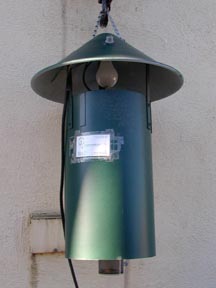Cumberland County Mosquito Control Division
Questions And Answers
Can mosquitoes transmit coronavirus?
No, mosquitoes do not have the ability to transmit coronavirus.
What does our agency do?
Cumberland County Mosquito Control is a division of the Department of Public Works and Property of Cumberland County and is involved in all aspects of mosquito control. We have two full time inspectors who inspect known mosquito habitats for the presence of mosquitoes and apply pesticides to those areas as necessary. In addition, they respond to service requests by inspecting and treating any mosquito habitats found at residents’ homes or businesses. Our Superintendent is a graduate-level entomologist, and we have a Biologist who assists in inspections and control, is responsible for mosquito surveillance through the use of various types of mosquito traps, and for mosquito identification. In addition, the Biologist handles public education, and will conduct educational programs for schools, civic groups, and other organizations upon request.
Our agency also participates in a vector surveillance program coordinated by Rutgers University and the Office of Mosquito Control Coordination, a division of the New Jersey Department of Environmental Protection. This program involves sampling mosquitoes from various areas throughout the County and sending them to the New Jersey Department of Health to have them tested for various encephalitis viruses. If any sampled mosquitoes test positive, we will intensify our inspection and control efforts in those areas in an attempt to minimize possible risk to County residents, their pets, and their livestock.
How does our agency control mosquitoes?
Cumberland County Mosquito Control Division uses an integrated pest management (IPM) approach to control mosquitoes. This approach utilizes several methods of pest control, including mechanical, biological, and chemical.
 We also employ heavy equipment operators who use various types of large machinery to engage in water management practices, or source reduction, to remove or modify mosquito habitats.
We also employ heavy equipment operators who use various types of large machinery to engage in water management practices, or source reduction, to remove or modify mosquito habitats.
Source reduction is the largest component of our mosquito control program, and in many cases, can permanently affect mosquito population levels. Biological control can also be quite effective in eliminating mosquitoes. In this aspect of our program, we identify isolated, permanent bodies of water and introduce minnows and other types of fish to feed on mosquito larvae. Our chemical control program consists of the application of larvicides and pupicides to kill the immature stages, and adulticides to kill the flying adults. Typically, the non-chemical methods are preferred since they are the most effective; however, pesticide applications are necessary if the other methods are ineffective or not feasible.
What can the general public do to help us with our mosquito control program?
For our program to be successful, it is very important for us to get as much help from the general public as possible. It can be a futile endeavor employing various mosquito control methods if our residents are allowing mosquitoes to use their own properties as habitats!
Here are some tips to prevent mosquitoes from breeding on your property:
- keep rain gutters free of debris
- clean birdbaths at least once a week
- keep yard and surrounding areas free of any artificial containers, which can collect rainwater
- eliminate standing water from crawl spaces and basements

Examples of artificial containers include:
- Unused Wading Pools
- Opened Trash Cans
- Tires
- Pool Covers
- Wheel Ruts
- Large, Deep Mud Puddles
- Buckets
- Wheelbarrows
- Ornamental Ponds Without Proper Aeration or Fish
- Empty Planting Pots
Anything holding water for at least four days can become a mosquito habitat. In addition, if you find a mosquito habitat, or if you think you might have an area conducive to the placement of fish, do not hesitate to call our office.
Which pesticides are used to control mosquitoes in Cumberland County and how are they applied?
In Cumberland County we use larvicides, a larvicide/pupicide, and adulticides to control mosquitoes.
The larvicides we use include:
- Altosid – active ingredient is methoprene
- Vectobac - active ingredient is Bacillus thuringiensis israelensis
- Vectomax - active ingredient is Bacillus thuringiensis israelensis and Bacillus sphaericus
- Duplex - active ingredient is Bacillus thuringiensis israelensis and methoprene
The larvicide/pupicide we use is:
- CoCo Bear- active ingredient is mineral oil
The adulticides we use include:
- Essentria All Purpose Insecticide Concentrate – active ingredients are rosemary and peppermint oils
- Zenivex E20 – active ingredient is etofenprox
Altosid is used as a 30-day or 150-day briquet and is placed directly in water. Vectobac is applied as a liquid or granule directly to water with a hand-held compressed air sprayer or seed spreader, or may be applied by aircraft. Vectomax is applied as a granule directly to water with a seed spreader or back pack sprayer. Duplex is applied as a granule directly to water with a seed spreader. CoCo Bear is applied as a liquid directly to water with a hand-held compressed air sprayer. Essentria All Purpose Insecticide Concentrate is applied to foliage in a coarse mist created by a truck-mounted mist blower. Zenivex E20 is applied directly into the air to contact mosquitoes while on the wing as an Ultra-Low-Volume (ULV) spray by ground equipment. All products used are registered with both the USEPA and NJDEP, which means they are legal for use in New Jersey.
In addition, our Division Superintendent, inspectors, heavy equipment operators, and Biologist are all licensed certified pesticide applicators by the NJDEP.
How do I contact Cumberland County Mosquito Control Division and get more information?
If you would like us to inspect your property, if you want to report a mosquito habitat, or you would like help with anything else mosquito-related, please call 856-453-2192 Monday – Friday between 8:00 a.m. and 4:00 p.m. If you would like to speak directly to the Superintendent, call 856-453-2170 Monday – Friday between 8:00 a.m. and 4:00 p.m. If you would like to speak directly to the Biologist, Assistant Chief Inspector, or Supervising Heavy Equipment Operator, call 856-453-2197 Monday – Friday between 7:00 a.m. and 3:30 p.m.
For general information:
Where can I find more specific information on mosquito spraying in Cumberland County and how will I be notified?
Call the Cumberland County Mosquito Control Division at 856-453-2192 or check the notices on this web site or in two local newspapers throughout the mosquito control season. The two newspapers we use are South Jersey Times and The Daily Journal. A citizen has the right to ask the Cumberland County Mosquito Control Division for specific information about a planned application prior to the pesticide treatment.